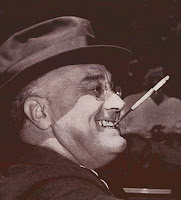As the economy continues sliding deeper into the morass we have seen the last years, few can say they haven’t also noticed the friction with public employee unions, especially in regards to the militancy on display in Wisconsin over Governor Walker’s stand in regards to the unions.
Locally, in Clark County Washington, a much lesser degree of friction has been seen with public employee unions negotiating their new contracts, with citizens already struggling calling upon the unions to accept paying more of their health insurance premiums and some even suggesting a pay cut, commensurate with that the private sector has been hit with.
While there have been some small concessions on their part, nowhere near to the degree private sector employees have faced, there are still demands for wage increases, less working hours, more vacation time and such.
Needless to say, this isn’t setting well with much of the private sector.
We were warned on public employee unions years ago. In 1937, then president Franklin Delano Roosevelt, struggling with what we call the “Great Depression” wrote a letter to Luther C. Steward, President of the National Federation of Federal Employees, declining an invitation to the Twentieth Jubilee Convention of the National Federation of Federal Employees.
While some see the letter as Roosevelt being opposed to public unions, I see his comments as more of a caution to them and the potential harm they could inflict by carrying on as many currently are. Roosevelt was a liberal, don’t forget.
Roosevelt said in part,
“The desire of Government employees for fair and adequate pay, reasonable hours of work, safe and suitable working conditions, development of opportunities for advancement, facilities for fair and impartial consideration and review of grievances, and other objectives of a proper employee relations policy, is basically no different from that of employees in private industry. Organization on their part to present their views on such matters is both natural and logical, but meticulous attention should be paid to the special relationships and obligations of public servants to the public itself and to the Government.
All Government employees should realize that the process of collective bargaining, as usually understood, cannot be transplanted into the public service. It has its distinct and insurmountable limitations when applied to public personnel management. The very nature and purposes of Government make it impossible for administrative officials to represent fully or to bind the employer in mutual discussions with Government employee organizations. The employer is the whole people, who speak by means of laws enacted by their representatives in Congress. Accordingly, administrative officials and employees alike are governed and guided, and in many instances restricted, by laws which establish policies, procedures, or rules in personnel matters.
Particularly, I want to emphasize my conviction that militant tactics have no place in the functions of any organization of Government employees. Upon employees in the Federal service rests the obligation to serve the whole people, whose interests and welfare require orderliness and continuity in the conduct of Government activities. This obligation is paramount. Since their own services have to do with the functioning of the Government, a strike of public employees manifests nothing less than an intent on their part to prevent or obstruct the operations of Government until their demands are satisfied. Such action, looking toward the paralysis of Government by those who have sworn to support it, is unthinkable and intolerable. It is, therefore, with a feeling of gratification that I have noted in the constitution of the National Federation of Federal Employees the provision that ‘under no circumstances shall this Federation engage in or support strikes against the United States Government’.” (emphasis added)
Reinforcing this is the 1955 comment credited to George Meany, then president of the AFL-CIO when he said, “It is impossible to bargain collectively with the government.”
 Thanks to President John F. Kennedy signing Executive Order 10988, EMPLOYEE-MANAGEMENT COOPERATION IN THE FEDERAL SERVICE into law in January 1962, almost 50 years later we see where private sector union membership has drastically fallen off while membership in public employee unions has bypassed that of the private sector and is growing.
Thanks to President John F. Kennedy signing Executive Order 10988, EMPLOYEE-MANAGEMENT COOPERATION IN THE FEDERAL SERVICE into law in January 1962, almost 50 years later we see where private sector union membership has drastically fallen off while membership in public employee unions has bypassed that of the private sector and is growing.
Gone are the cautions expressed by President Roosevelt as have seen communities crippled by militant strikes of public union employees demanding more and more of our hard earned tax dollars, even if we have none left to give.
Roosevelt made his share of mistakes in his ‘New Deal’ that many say actually prolonged the Great Depression, but he possessed the wisdom to note that public unions wielding power was counter to what our government is and how detrimental they could be to the nation.
We see that today unfolding in Wisconsin as school children are once again being held hostage to greedy union members being bused in from outside the area to spew their hate and vitriol at the very people who pay their salaries.
George Meany was wrong when he said, “It is impossible to bargain collectively with the government.” It’s not impossible, but it has been proven to be very unwise and detrimental to the nation’s economy.
If the public unions end up broken now, and it is my sincerest hope that they are, they only have their own greed to blame.





